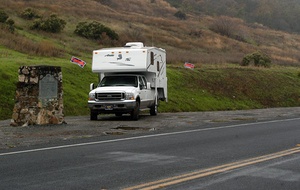Perhaps no more horrible crime than the murder of this pioneer is often found on the pages of any history, and positively no better example of justice following the guilty than which tracked one among the murderers to punishment eleven years after the commission of his foul deed. Dr. Marsh had been for several years—long before the American occupation of California—the owner of the Los Meganos Rancho, of which he became possessed, as we have elsewhere stated, by purchase within the year 1837. Here he dwelt, surrounded by his people, flocks and herds, for full 20 years. On or about the twenty-fourth day of September, 1856, business called him from his farm to Martinez, some thirty miles distant. within the grey dawn of the subsequent morning his horse and buggy were found within the town of Martinez, but without an occupant. Then followed the search, which led to the invention of his body in a very road-side ditch, immediately upon which the pursuit of the murderers was undertaken. On the day following Jose Antonio Olivas was captured; after making confession as to certain money found in his possession, taken from the body of the murdered victim, and implicating Felipe Moreno as principal within the deed, he was tried and convicted, but escaping from jail, he eluded justice for quite ten years. In September, 1866, he was re-captured in Santa Barbara county, and dropped at Contra Costa to await his trial. About the identical time Felipe Moreno was taken in Sacramento, where he was going under the alias of Don Castro. When arrested he made a desperate effort to escape, but being mastered was quickly handcuffed and incarcerated. The third-party implicated within the terrible murder, Juan Garcia, has, up to the present time, eluded justice. The trial of Felipe Moreno for the murder of Dr. John Marsh was commenced on Saturday, September 23, 1867, and on the subsequent Thursday the jury brought in a verdict of murder within the second degree against the prisoner. The principal and only positive witness for the prosecution on this trial was Jose Antonio Olivas, one among the three persons indicted for the murder. Separate trials for the prisoners had been procured by District-Attorney Mills, with the purpose of using the testimony of Olivas for the State, and corroborating it, as to material points, by that of unimpeachable and disinterested witnesses. The defense relied mainly upon having the ability to prove an alibi; but notwithstanding the very able efforts of M. S. Chase, of Martinez, the counsel for the prisoner, the testimony didn't convince the jury, because the verdict shows, although it absolutely was not as severe as may need been expected, and this possibly due to the youth of the prisoner at the time, and therefore the doubt remaining on whether he may are a chief or an auxiliary actor within the perpetration of the murder. The story of the Doctor's death, as told by Olivas, is as follows: On the morning of September 24, 1856, the date of the murder, Jose Antonio Olivas and Felipe Moreno, aged twenty-five and nineteen years respectively, in company with some females, came into the village of Martinez, where, having attended church, they proceeded to Pinole, coming back from thence between four and five o'clock that very same evening. They shortly continued their journey to Pacheco alone, and when reaching the Hill a few miles from Martinez paused awhile to await the arrival of Juan Garcia, who was expected to fulfill them. Olivas then went on ahead for about 2 hundred yards, when he was overtaken by his comrades, and therefore the three urged their horses into a gallop. While so proceeding they met a person named Swanson. shortly after this circumstance, Doctor Marsh was observed to be coming in his buggy. Hereupon he was accosted by Olivas, who asked him for sure money because of him for services as a vaquero, to which the Doctor replied that he would be paid on his return from San Francisco, but that he had no money with him then. The deceased now drove away, while the party remained behind and concocted a scheme to kill him, but finally arranged that he should only be robbed. They then followed in pursuit, and on overtaking their victim, Olivas, by Moreno's orders, seized the Doctor's horse by the pinnacle, while Moreno jumped into the buggy and Garcia stood guard alongside. The deceased directly faced his enemy and said: "Do you would like to kill me?" to which he received the reply "No" from Olivas, and "Yes" from Moreno, and notwithstanding the dissuasions of his companions, this youthful fiend slashed the unfortunate man within the face with a knife. He was then draped out of the vehicle and fell to the ground, being before, however, wounded within the hand; Olivas having then dismounted, as he says, for the aim of assisting the Doctor, who came towards and struck at him, a scuffle ensued, Olivas crying to Moreno to free him. Thereupon Moreno observed: "why should I jilting this old Cabron" and forthwith stabbed his prostrate victim within the left side. Upon receiving this wound the Doctor cried aloud when Moreno was prepared to repeat the operation but was pushed away by Olivas, who parried a cut made at him. The Doctor now attempted to rise but was only able to stagger a brief distance and fell into a ditch-dead. His pockets were then rifled by Garcia to find Moreno, who afterward cut his throat, the deed being witnessed by Olivas from his saddle. This terrible crime being perpetrated, the triumvirate repaired to the highest of a convenient hill and there divided the booty, whence they repaired to some houses for the night and afterward fled, and for ten years and upwards escaped the iron hand of the law. Moreno was sentenced to imprisonment forever within the prison on Friday, November 29, 1867.
ADDITIONAL INFO ABOUT JOHN MARSH: https://en.wikipedia.org/wiki/John_Marsh_(pioneer)




